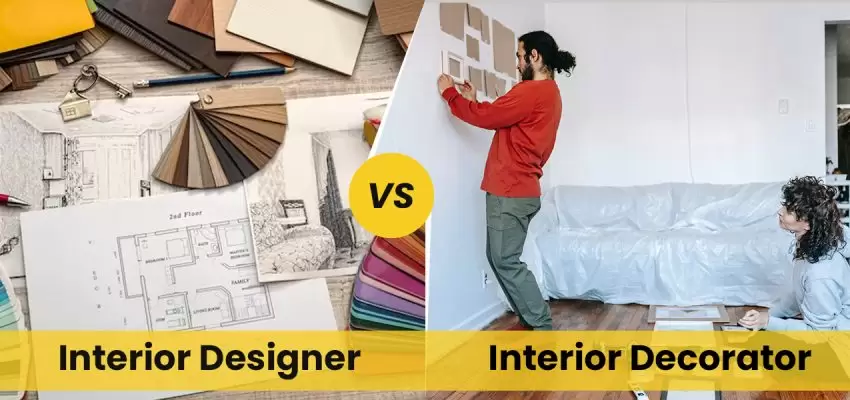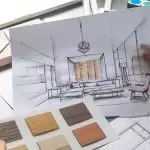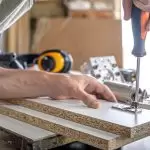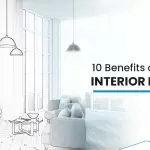The words interior design and interior decoration are used interchangeably because they often are believed to be synonymous terms that both include enhancing the overall appearance and feel of the interior spaces. When people hear the term interior design, they typically think of DIY projects or certain elements, chandeliers, lighting fixtures, or others that can be included in their interiors. So let me clarify it for you, the decoration elements or your creative ideas of decorating your room come under the scope of interior decoration, not interior designing.
Post your Requirement
Interior decoration and interior design are two different terms that are components of the same industry but the scope of work, the professionals needed and the final product of the two services are significantly different. If we look in the dictionary, the definition of a designer is the “one who creates and often executes plans for a project or structure” while the decorator is the “one that designs or executes interiors and their furnishings”.
Interior Decorator Vs Interior Designer: What’s the difference?
1. Definition
While there is considerable overlap in the concepts of interior design and interior decoration, the core of the terms are different. Interior design refers to the art and science of understanding people’s needs in terms of design and functionality and then designing the spaces based on the achieved preferences. On the other hand, interior decoration refers to the process of furnishing or adorning the spaces with a variety of materials or elements to create a certain aesthetic or appearance.
The interior designers have a specialization in the technical work involved in enhancing the overall look, feel, and functionality of the spaces. They work with a team of architects and other construction professionals to make structural changes, have expertise in the building processes and the building codes and thus can make functional, practical spaces based on clients’ preferences.
Interior decorators are professionals who work with beautiful aesthetically pleasing objects and cater to colour schemes, designs, and the overall look of the spaces to make them visually pleasing and impressive for all. In short, we can say that interior designers can decorate but interior decorators cannot design.
2. Educational Qualifications
Whether you wish to become an interior designer or an interior decorator, you need to have some kind of formal education and training that helps you to build expertise in the field and to serve diverse purposes in the same. The educational and qualification requirements of the fields are considerably different due to the technical nature of the interior design services and the aesthetic purposes of the other.
2.1 Education Qualifications Of The Interior Designers
Interior designers are skilled professionals who undergo proper training and education to gain expertise in offering a perfect blend of technical and creative excellence in their operations. Their expertise goes way beyond just aesthetics to encompass structural design, space planning, and safety considerations.
Interior designers typically need to have a three to five-year degree in the field of interior design, architecture, or other relevant fields. This degree ensures comprehensive training for the student in terms of design principles, technical drawings, and software applications. Several institutions also offer diploma or shorter programs in the field focusing on the development of practical skills based on the needs of the future architectural industry.
Additionally, some colleges and universities also offer master’s degrees in interior design for those who want to pursue higher education in this field and gain advanced skills in design concepts, research, and project management. The basic skillset that is crucial to the interior designers include the following:
- Space planning and ergonomics.
- 3D modeling and CAD software (e.g., AutoCAD, SketchUp).
- Knowledge of materials, textures, and finishes.
- Lighting design and building systems.
- Sustainable design practices.
2.2 Education Qualifications Of The Interior Decorators
Unlike interior designers, the work of interior decorators typically focuses on the aesthetic appeal of the spaces. Therefore these professionals do not necessarily require formal education, training, or college degrees. Their scope of work usually revolves around choosing the right colour schemes, furniture, and accessories to make the home or any other interior space visually appealing and comforting.
Numerous institutes offer certificate or diploma courses in interior decoration, which last from a few months to a year. These programs typically focus on topics such as color theory and texture combinations, furniture selection, and placement, and other kinds of decorative elements such as curtains, rugs, and wall art. They also learn how to work with clients, and how to create a cohesive design plan and therefore have expertise in transforming spaces into beautiful, comforting havens. The key skills and capabilities required for interior decorators to serve as professionals include the following:
- Attention to detail and a keen sense of creativity, style, and design.
- Understanding of client needs and preferences.
- Knowledge of current trends in decor.
- Budget management and sourcing skills.
3. Expertise And Scope Of Work
In public perception, interior designers and interior decorators might sound like similar professionals but their scope of work and expertise is very different. Before you plan to get some technical or aesthetic expertise for your interiors, you need to first understand the difference between interior designers and decorators, and their scope of work, and then make an informed decision about which professional to hire.
3.1 Scope Of Work Of Interior Designers
Interior design is a coordinated, systematic, and multifaceted process that includes a wide range of tasks aimed at enhancing the functionality and beautification of interior spaces. This includes proper research, analysis, and integration of knowledge into the creative process—to satisfy the needs and resources of the client.
Interior designers have a deep understanding of the spatial arrangements, architectural principles, and technical aspects of interior design and thus work to create spaces that are not just graceful but also serve their specific purposes with perfection. The interior designers manage and lead a comprehensive range of tasks that includes various aspects of a project, from the initial conceptualization to the final execution. Some of the few components of the roles and responsibilities of the interior designers are as follows:
- Space Planning: One of the key roles of interior designers is they assess the layout of the space, how people move and operate in that space, and then plan how that space can be molded in a design that has superior functionality and practicality.
- Colour And Material Selection: Home interior designers usually have a strong grasp of colour theories and thus plan colours and paints, materials, finishes, and other relevant elements to create a cohesive design with enhanced appearance and grace. The home designers understand the properties and uses of materials like wood, metal, glass, and textiles, ensuring the best choices for durability and aesthetics.
- Furniture And Fixture Selection: It also comes under the scope of work of the experts at the interior design company to select the different furniture elements, lighting, and other fixtures to build the proper design vision and bring it to reality. They typically have a deep understanding of ergonomics and psychology and create detailed plans based on that.
- Building Codes And Regulations: The house interior designers stay aware of the local building codes and regulations that are currently prevalent in the industry. Therefore they ensure proper selection and placement of the elements and ensure every aspect of the project meets the legal requirements. In the present changing dynamics, interior designers also offer different kinds of eco-friendly options and energy-saving solutions due to the rising environmental consciousness of the people.
- Collaboration: Collaboration is also an aspect of interior design services. The Interior designers work collaboratively with other professionals in the industry such as architects, contractors, electricians, plumbers, and numerous others to ensure that every work is done with dedication and with a commitment to perfection.
- Project Management: This is one of the greatest roles to play when you seek home interior design services. The home interior designers oversee the project, managing budgets, and timelines, coordinating with contractors and vendors, and ensuring everything is done as planned.
Read In Detail: Interior Designers: Roles, Types, Costs, And Hiring Tips
3.2 Scope Of Work Of Interior Decorators
Interior decoration is aimed at adorning or embellishing a room by adding certain aesthetic elements or structures to it. Interior decorators typically work with existing spaces and do not make any structural changes or functional changes to the space. The interior decorators work by first understanding the expectations and aesthetic preferences of the clients, and then using their principles of decorating, to offer beautiful, sophisticated spaces. The interior decorators make the final touches without changing the structure of the spaces. Their roles are given as follows;
- Colour Schemes: The creative domains of work come under the scope of interior decorators in the architectural industry. They are responsible for the selection of colour palettes, the paint for walls, fabrics for furniture, and the selection of other decor elements.
- Furniture and Accessories: The interior decorators guide the client in terms of which furniture to choose, which accessories to add, and how to build a look that captivates every eye they meet. Whether you should get a chandelier in the centre of your living room, a minimalist lamp, or a baroque mirror to make a statement with your structures.
- Textile And Fabrics: The interior decorators also possess expert knowledge regarding the different textiles and fabrics such as curtains, drapes, and upholstery that can help to create a cohesive design. They guide you regarding the different elements whether it be lush velvet sofas, sheer curtains, elegant rugs, or anything else, they help you choose the right elements to enhance the feel of your home.
- Art And Decorative Elements: They help the clients to create a theme and ambience of the home or other space, and then also suggest the artwork and decorative items that can complement the look.
- Personalization: One of the most important features of interior decorators is that they work closely with the clients, understand their preferences, create a style according to that, and arrange all the different elements to ensure the perfect creation of the client’s vision.
4. Licensing And Regulations
When it comes to different professional requirements that come the way of interior designers and interior decorators, there are several differences between the two. The certifications and regulations are some of the factors that you need to consider while making an informed decision.
4.1 Interior Designers
In many regions, interior designers are subjected to certification. In these cases, the interior designers need to meet rigorous educational and experience-based criteria, and then pass a professional examination to be able to practice their profession.
Additionally, interior design services include a variety of structural work, therefore the home interior designers need to be aware of the relevant building codes, and the building rules and regulations to be taken care of to prevent any legal issues or concerns. The interior designers need to be licensed with proper expertise to be trusted by the clients.
4.2 Interior Decorators
The interior decorators are not typically subjected to different licensing requirements. The interior decoration does not include changing the layout and structure of the spaces and thus they are not usually expected to be subjected to any legal concerns or issues.
Interior decorators can work with their creativity, precision, and expertise without any essential certificate or license and do not need to be consistently aware of the building codes.
5. Costs And Expenses
The costs and expenses involved in any project typically depend on a variety of factors such as the scope of the project, the professional’s expertise, the location, and the materials used. The interior designers take up the project management work and the budgeting plans under their scope and thus help the clients make informed decisions for the allocation of the budget. On the other hand, the interior decorators control the decor work and therefore usually have a narrower involvement when it comes to budgeting considerations and allocation.
5.1 Interior Designer Costs
The home interior designers manage a holistic range of work and work in everything from space planning, and selection of furniture, materials, and decoration elements to structural modifications and layout changes. Therefore their fees are quite high including the costs of design consultation, execution, and different aspects of project management. In the present dynamics, the interior designers may charge 5%–15% of the total project cost, which includes furniture, fixtures, materials, and labour. If you are hiring high-end designers for a luxury project, the costs may go up to 20%.
Suggested Post:
5.2 Interior Decorators Costs
Interior decorators typically have a narrower scope of work as compared to interior designers as they aim to enhance the aesthetic appeal of the interiors with a careful selection of colour palettes, furniture elements, decors, textiles, and other accessories. As their work does not include any structural modification or layout changes, their services are also significantly more affordable as compared to interior design services. The interior decorators usually charge around 10%–20% of the total cost of furnishings, decor, and accessories purchased.
Key Difference Between Interior Designer And Decorator
|
Factors To Consider |
Interior Designers |
Interior Decorators |
| Scope of Work | Focuses on functionality, safety, and aesthetics of spaces. | Focuses solely on aesthetics and style. |
| Structural Changes | Can recommend and implement structural changes. | Does not handle structural or layout modifications. |
| Education | Requires formal education and licensing. | No formal education is required. |
| Collaboration | Works with architects, contractors, and engineers. | Collaborates mainly with clients and suppliers. |
| Costs | Comparatively higher due to the wide scope of work. | Relatively cheaper due to the narrower scope of work. |
| Project Examples | Designing a kitchen layout, adding a room, and office space planning. | Styling a living room, changing the look of a bedroom, choosing home accessories. |
Interior Design VS Interior Decorating: Which To Choose
When planning to undertake interior work, it always comes as a dilemma about whom to choose in the popular interior decorator vs designer question. It is not a very complex question if you know your goals and expectations from the project and the scope of work you need. To help you make the right decision, let me make the difference between the two easy for you.
Hire The Interior Design Services If You:
- You are opting for a major renovation project or building your space from scratch.
- You want to make some structural or layout changes to your space. It might include removing some walls, expanding a room, or others.
- You can undertake construction and you need help regarding the space planning and layout.
- You want a professional who can manage the entire design process for your interiors, from conceptualization to project completion.
- Your project involves adherence to building codes and regulations and you need guidance regarding the same.
Hire An Interior Decorator If You:
- You wish to refresh the overall look and feel of your space.
- You are primarily concerned with the aesthetics of the space without major renovations.
- You are not planning significant structural changes or renovations.
- You want to add a personalized look to your space with careful consideration of furniture, textiles, decor, and accessories.
- You want to enhance the look but work under a specific budget for decor and furnishings.
- You are staging a place for sale and want it to look extra tempting with an enhanced look.
How To Hire An Interior Designer Or Interior Decorator?
First, it is important to clarify that professional interior designers and decorators often work collaboratively on projects to provide a perfectly built, designed, and decorated place to the clients. However, if your scope of work can be done by one professional, it is better to hire the one you need.
Whether you wish to hire a designer or a decorator, you need to choose someone who resonates with your vision. Your home is an extension of yourself; make sure it gets the expertise it deserves from a trusted professional. We at McCoy Mart work for this cause. We understand the emotional connection associated when you plan a space and thus help you connect with the most reliable professionals in the architectural industry to build your space with excellence in mind.
Read Also: Tips To Choose the Right Interior Designer: A Homeowner’s Guide























Post A Comment